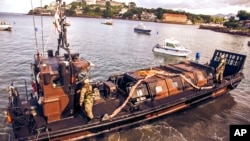Relatives of Ebola patients in Sierra Leone on Saturday criticized hospitals for rejecting sick people and not moving fast enough to tackle the outbreak.
Earlier this week, the U.N. Mission for Ebola Emergency Response (UNMEER) warned the number of Ebola cases is surging in Sierra Leone because of a lack of treatment centers, while scarcity of food may also be forcing some people to leave quarantined areas, risking further spread of the virus.
The warning came as Sierra Leone's deputy minister of health said Ebola had so badly damaged confidence in the West African country's health system that many people were dying from other diseases as the sick refused to come to clinics for treatment.
Criticizes health system
Sierra Leone resident Abubakarr Janneh has had some members of his family die of Ebola. Others are now sick, and the whole family is worried. Janneh doesn't live in the same house with his relatives infected by Ebola, but he said the health system is not working.
“We have been calling but no response, except some family members decided to hire a taxi to bring them to this hospital and when they came they were rejected. So this is why people are afraid to come to hospital,” he told Reuters.
Fatu Filli, whose sister is battling the lethal virus, said patients being rejected from hospitals was commonplace.
“This is one of the reasons why people are not coming to hospital. Because this type of sickness leads to death, you have to roam all around different hospitals, and at the end you lose your life, because you have been rejected at several hospitals," Filli said.
"And before this Ebola outbreak other diseases were already existing such as malaria, typhoid, even cholera and headache, but since the Ebola outbreak even if you have a slight headache, they attribute it to Ebola, so you don't even know what to do,” Filli said.
Death toll
Nearly 5,000 people have died of Ebola, mostly in Sierra Leone, Liberia and neighboring Guinea, the World Health Organization said Wednesday.
While the situation is improving in Liberia and stable in Guinea, two-thirds of the new cases recorded in the past three weeks have been in Sierra Leone.
UNMEER said at present, Sierra Leone had just four Ebola treatment centers with a total capacity of 288 beds and these were treating 196 cases of the disease as of November 1.
Locals said the lack of beds in treatment centers, and the delays in admitting Ebola patients into a hospital, also contribute to the high number of deaths.
“The government has said before that if you have any sick person at home you should call the emergency number, but you have to call several times, and even if they respond, it will be after two to four days. So the slow response is the problem and that is why people are afraid to come to the hospital,” Filli said.
The U.N. mission said it suspects 50 percent of cases of the Ebola virus were not being reported in Sierra Leone.
To control the outbreak, UNMEER estimated a total of 1,864 beds were needed by December, but the 10 new treatment centers currently planned had a total capacity of just 1,133 beds.





